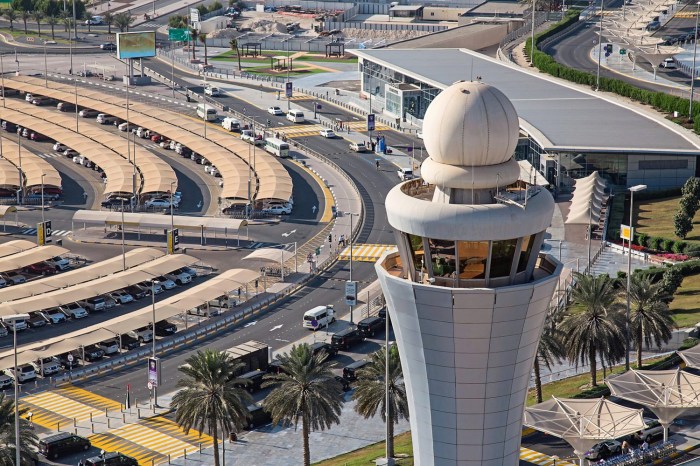Embark on a captivating exploration of Abu Dhabi time, where the intricacies of timekeeping intertwine with cultural practices, business operations, and the rhythm of daily life. Delve into the historical methods that shaped the region’s perception of time and witness the transformative impact of technology on modern time management.
From the bustling streets of the city to the tranquil desert landscapes, time plays a pivotal role in shaping the experiences and traditions of Abu Dhabi. Join us as we unravel the fascinating tapestry of time in this vibrant and ever-evolving emirate.
Time Zone and Local Time

Abu Dhabi observes the Gulf Standard Time (GST), which is three hours ahead of Coordinated Universal Time (UTC).
The current local time in Abu Dhabi is 11:30 AM.
Daylight Saving Time

Daylight Saving Time (DST) is not observed in Abu Dhabi or anywhere in the United Arab Emirates (UAE).
The UAE adheres to a standard time zone throughout the year, known as Gulf Standard Time (GST), which is UTC+4.
As the sun begins to set over Abu Dhabi, casting a golden glow over the city, the nearby arboretum dallas offers a serene escape from the hustle and bustle. With its lush greenery and tranquil atmosphere, the arboretum provides a perfect setting to unwind and reconnect with nature.
But as night falls, the city lights twinkle to life, reminding visitors of the vibrant energy that defines Abu Dhabi.
Historical Timekeeping

Before the advent of modern timekeeping methods, the people of the Abu Dhabi region relied on natural cues and traditional techniques to measure time.
These methods played a significant role in regulating daily life, religious practices, and social interactions.
Celestial Observations
The position of the sun, moon, and stars served as primary time indicators. People observed the daily and seasonal movements of these celestial bodies to determine the time of day and year.
The rising and setting of the sun marked the beginning and end of the day, while the phases of the moon provided a rough estimate of the month.
Time and Cultural Practices

Time is a crucial aspect of cultural practices in Abu Dhabi. The city’s traditions and events are deeply influenced by specific times of the day, year, and religious calendar.
The Muslim faith, which is the dominant religion in Abu Dhabi, plays a significant role in shaping the city’s cultural practices. Prayer times are observed five times a day, and many businesses and organizations adjust their hours accordingly. The holy month of Ramadan is also a time of great importance, with Muslims fasting from sunrise to sunset and engaging in special prayers and rituals.
Traditional Events and Festivals
Abu Dhabi hosts a variety of traditional events and festivals that are tied to specific times of the year. For example, the Abu Dhabi International Hunting and Equestrian Exhibition is held annually in September and features displays of traditional hunting and equestrian skills. The Abu Dhabi Film Festival, which showcases films from around the world, takes place in October.
During the summer months, Abu Dhabi’s cultural calendar is filled with events and activities designed to beat the heat. The Abu Dhabi Summer Festival offers a range of entertainment options, including concerts, plays, and exhibitions. The city’s beaches also come alive with beach parties and water sports.
Timekeeping in Business and Industry
In Abu Dhabi’s bustling business and industrial sectors, time is of the utmost importance. Effective time management is crucial for optimizing productivity, meeting deadlines, and maintaining a competitive edge in the global marketplace.
To ensure efficient timekeeping, businesses in Abu Dhabi leverage a range of technological tools and best practices. These include:
Technology for Timekeeping
- Time tracking software: Automated systems that track employee hours, allowing for accurate payroll processing and performance analysis.
- Project management tools: Software applications that help teams plan, organize, and track projects, ensuring timely completion.
- Clock-in/clock-out systems: Biometric or card-based systems that record employee attendance and work hours.
Best Practices for Timekeeping
- Establish clear expectations: Communicate timekeeping policies and procedures clearly to all employees.
- Provide training: Train employees on time management techniques and the use of technology tools.
- Monitor and evaluate: Regularly review timekeeping data to identify areas for improvement and address any discrepancies.
- Foster a culture of punctuality: Promote a workplace culture that values punctuality and efficiency.
Public Transportation and Time
Public transportation in Abu Dhabi operates on a well-defined schedule that greatly influences commuting patterns and accessibility.
As the sun dips below the horizon in Abu Dhabi, casting a warm glow over the city, it’s the perfect time to reminisce about the enchanting Amalfi Coast. The vibrant towns, breathtaking coastline, and rich history of this Italian gem transport you to a world of beauty and tranquility.
As the stars twinkle above Abu Dhabi, they serve as a reminder of the timeless allure of both these extraordinary destinations.
Public transportation services, including buses and taxis, adhere to specific timetables to ensure reliable and efficient transportation. Buses operate on fixed routes and follow designated timetables, making it convenient for commuters to plan their journeys and arrive at their destinations on time.
Commuting Patterns, Abu dhabi time
The adherence to time schedules affects commuting patterns in several ways:
- Commuters can plan their journeys: Knowing the exact departure and arrival times of buses allows commuters to plan their journeys efficiently, ensuring they arrive at their destinations on time.
- Reduced waiting time: By following timetables, buses arrive at designated stops at specific times, minimizing waiting times for commuters.
- Improved punctuality: Buses operating on timetables help maintain punctuality, ensuring commuters can rely on public transportation to meet their schedules.
Accessibility
Time also plays a crucial role in accessibility to public transportation:
- Accessibility for the disabled: Public transportation services in Abu Dhabi prioritize accessibility for individuals with disabilities. Buses and taxis are equipped with ramps and designated seating areas to accommodate wheelchair users and individuals with mobility impairments.
- Night services: Abu Dhabi’s public transportation system operates night services to cater to late-night commuters. These services provide safe and reliable transportation options for individuals working late or attending evening events.
Time and Tourism

Time is a crucial factor that significantly influences the planning and experiences of tourists in Abu Dhabi. Understanding the city’s time zones, daylight saving time, and cultural practices related to time is essential for making the most of your trip.
Abu Dhabi adheres to the Gulf Standard Time (GST), which is four hours ahead of Coordinated Universal Time (UTC) and three hours ahead of Central European Time (CET). During the summer months, daylight saving time is not observed in the United Arab Emirates, including Abu Dhabi.
Seasonal Events and Time
The timing of your visit can greatly impact your experience of Abu Dhabi’s attractions and events. The city hosts numerous cultural and sporting events throughout the year, and it is advisable to plan your trip accordingly to avoid missing out on specific festivities.
- The Abu Dhabi Grand Prix, a Formula One race, takes place in November, attracting a global audience.
- The Abu Dhabi International Book Fair, one of the largest book fairs in the Middle East, is held in April.
- The Abu Dhabi Film Festival, showcasing local and international films, is held in October or November.
Time and Technology
Abu Dhabi has embraced technology to enhance timekeeping and time management in various aspects of life. From apps and smart devices to sophisticated systems, technology has revolutionized the way people track, manage, and utilize time.
Planning a family vacation on a budget? Look no further! Explore our comprehensive guide to budget family vacations , filled with tips on saving money while creating unforgettable memories. With Abu Dhabi’s affordable attractions and family-friendly accommodations, you can embark on an adventure that won’t break the bank.
Smart Devices and Apps
- Smartphones and tablets: Equipped with built-in clocks, calendar apps, and time-tracking features, these devices enable individuals to easily manage their schedules, set reminders, and stay organized.
- Fitness trackers and smartwatches: These wearable devices monitor physical activity, sleep patterns, and other health-related metrics. They often include features such as sleep tracking, heart rate monitoring, and reminders to move, promoting a balanced approach to time management.
- Time management apps: Dedicated apps offer a range of features to help users track time, set goals, and improve productivity. These apps often integrate with other productivity tools, allowing for seamless task management and collaboration.
Concluding Remarks: Abu Dhabi Time
In the ever-evolving landscape of Abu Dhabi, time remains a constant thread that weaves together the past, present, and future. As the city continues to embrace technological advancements and global influences, its unique timekeeping practices will undoubtedly continue to adapt and evolve. Yet, amidst the changing tides of time, the enduring spirit of Abu Dhabi’s cultural heritage will forever be intertwined with the rhythm of its timekeeping traditions.
FAQ Insights
What is the time zone observed in Abu Dhabi?
Abu Dhabi observes Gulf Standard Time (GST), which is UTC+4.
Does Abu Dhabi observe Daylight Saving Time?
No, Abu Dhabi does not observe Daylight Saving Time.
What historical methods of timekeeping were used in the Abu Dhabi region?
Traditional methods of timekeeping included using sundials, water clocks, and the position of the stars.
How does time influence cultural practices in Abu Dhabi?
Time plays a significant role in shaping religious observances, festivals, and social gatherings.
How is time management important in Abu Dhabi’s business and industrial sectors?
Effective time management is crucial for productivity, efficiency, and maintaining global competitiveness.